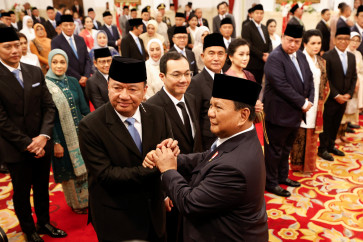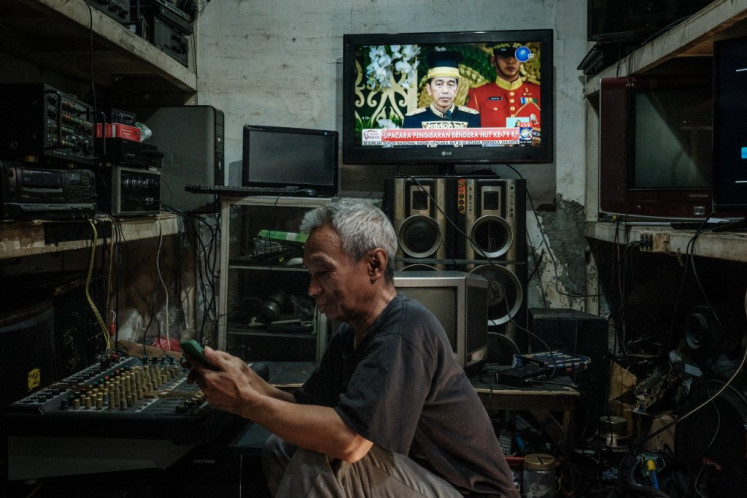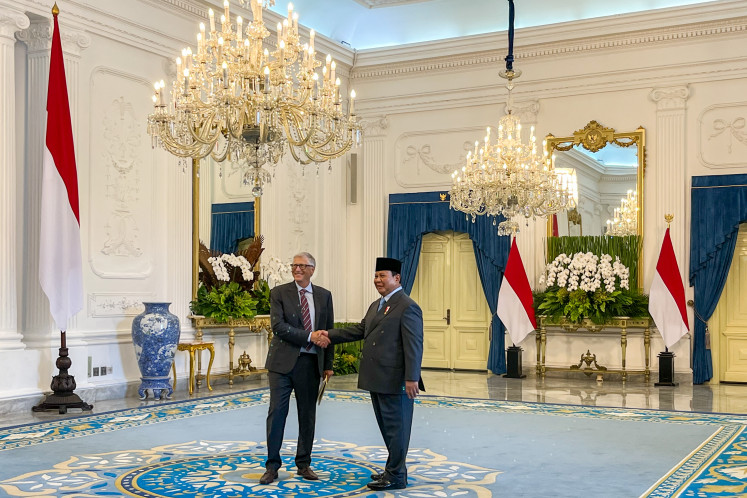Munir biography reminisces fallen human rights activist
A biography of late Indonesian human rights icon Munir sought to find the individual behind his larger-than-life image, introducing a new generation to his life and legacy.
Change text size
Gift Premium Articles
to Anyone

A
biography of the late Indonesian human rights icon Munir sought to find the individual behind his larger-than-life image, introducing a new generation to his life and legacy.
The death of iconic human rights activist Munir Said Thalib on board a Garuda Indonesia flight from Jakarta to Amsterdam on Sept. 7, 2004, was a shattering blow for social justice warriors across Indonesia. But perhaps no one felt the impact of his demise more than his fellow activist and widow Suciwati.
“I will always remember how you hugged and gazed at me the day before you departed [to Amsterdam]. You said that you found paradise, making me realize that I never regretted marrying you,” Suciwati recounted in a passage from Mencintai Munir (Loving Munir), a memoir she had written of their life together.
“You were my teacher, partner and fellow student [in life] […] when I held your cold hand and let it go, all I wanted was to remember your friendship, humor, determination, humility and love for Indonesia. I am very proud and blessed to have been at your side during our brief time together.”

Munir’s private side
The 54-year-old read her reminiscences during the book’s launching at Dia.lo.gue Artspace in the South Jakarta district of Kemang on Sept. 14.
A joint press release of the event from the Commission for Missing Persons and Victims of Violence (Kontras), The Indonesian Human Rights Monitor (Imparsial) and the Munir Human Rights Museum said the book aims to “maintain the memory of Munir as a human rights advocate who was determined to protect the victims of human rights violations and also portray him as a friend, father and husband.”
Suciwati asserted that she felt obliged to chronicle Munir’s efforts to uphold human rights in Indonesia, “as [the Indonesian elite] trampled on human rights far too often.” She admitted that the ten months that she took to compile and research materials for the book and write the manuscript took a toll on her.
“It took a month to gather my strength before I could revisit the past, [particularly Munir’s death]. The stress was reflected in migraines, stomachaches and other physical symptoms,” Suciwati recalled. “But I completed the work with the support of my loved ones.”
The book launch was an impromptu eulogy for the late Brawijaya University alumnus in Law. Several personages, including former Religious Affairs minister Lukman Hakim Syaifuddin and Fatia Maulidiyanti, the current head of the Kontras non-governmental organization (NGO) founded by Munir, joined Suciwati in reading excerpts from the memoir. The passages highlighted aspects of his personality, such as his humility, honesty and sincerity among others, that were little-known to the public.
“Munir was vilified by fellow activists [during the 2004 Presidential election] for endorsing [a presidential candidate] who signed a pledge to uphold human rights. They accused him of politicking, even selling out for political gain,” Lukman read. “‘You put your head on my lap as you recounted your frustrations at [your peers’] accusations before I made you some tea and told you to take a shower.’ The passage shows [Munir and Suciwati] as a husband and wife who loved, respected and gave to one another without expecting anything in return.”
He also hailed Suciwati as a spouse “who was not content to stand under Munir’s shadow, but continued the vision of a democratic and a fair Indonesia that made Munir one of the country’s most enduring and iconic pro-democracy advocates.”
Maintaining Munir’s fight
Among the challenges that Munir and Kontras faced, as recounted in Mencintai Munir, was their opponents’ ongoing accusation of them as foreign puppets who hated Indonesia and the government. This stigma is epitomized in a passage describing an attack on Kontras in 2002.
“A mob from the Panca Warga social organization stormed Kontras’ offices, clamored for the ‘traitor and foreign puppet’ Munir and struck him at the back of his head when he came to meet them. The protesters came after Munir voiced his opposition to the government after it launched a military operation in Aceh in 2002,” Suciwati recounted.
“The operation was particularly disappointing as [then] president Megawati Soekarnoputri pledged not to use force to deal [with the insurgency] in Aceh. The operation was the biggest of its kind after the fall of Suharto, as the military deployed more than 30 thousand troops to the province.”
Suciwati maintained that this was far from the truth.
“Munir fought against injustice and he always loved Indonesia and its people. Contrary to his opponents’ allegations that he was against the armed forces and the National Police, he often advocated for improved welfare of their personnel,” Suciwati said.
“He also insisted on using local businesses’ services, whether hotels or [national carrier] Garuda Indonesia. He even rejected a ticket by [Dutch airline] KLM on his flight to Amsterdam in favor of Garuda, though the trip ultimately killed him.”
Suciwati also called for Munir’s case to be reopened and classified as a human rights violation, as she deemed it an extrajudicial killing by the state, instead of a criminal case whose statute of limitations expired after it reached the 18-year limit on Sept. 7.
Off-duty Garuda pilot Pollycarpus B. Prijanto was later charged with poisoning Munir. A Jakarta court ultimately sentenced him to 20 years in jail in January 2008, before the sentence was reduced to 14 years. Suciwati’s efforts to find justice for Munir was further complicated after the suspected mastermind behind the murder, the National Intelligence Agency (BIN) deputy, Muchdi Purwoprandjono, was found not guilty in a separate trial.
Nonetheless, she managed to get one small victory at his expense during Muchdi’s trial during the Muslim holy month of Ramadan in 2008,
Suciwati recalled how she approached Muchdi. “As it’s the fasting [month], just admit [your crimes] to gain divine rewards. Red-faced, he blurted, ‘You shut up!’ Seeing his spontaneous reaction was rather satisfying,” she said.

Munir’s legacy lives on
Suciwati hopes that her memoirs of Munir will inspire younger people to continue his legacy, including Kontras head Fatia Maulidiyanti. Like millions of young Indonesian activists, the Parahyangan University alumnus in International Relations initially viewed Munir as a larger-than-life figure of the 1998 Reformation era following the toppling of former president Soeharto—not least because of his efforts to investigate the abduction of dozens of activists by the Army’s Kopassus special forces.
The case took a personal turn for her, as some victims were her relatives. However, Fatia was primarily motivated by her curiosity towards Munir’s works.
“My father referred to Munir as an enemy of the state and repeated [the conventional wisdom] that he and Kontras are foreign puppets and enemies of the state. He also warned me that I would share his fate if I joined Kontras,” said Fatia, who deepened her knowledge of human rights at the Kontras School of Human Rights (SeHAMA.)
“But his warnings backfired, as it motivated me to know more about him. Munir’s work was an eye-opener because [most] Indonesians are constantly reminded about our obligations, but not our human rights. His unwavering focus on upholding human rights, despite attacks and terrorization by his opponents on Kontras and himself is also admirable.”
Fatia hit the headlines earlier this year after Coordinator Maritime Affairs and Investment Minister Luhut Binsar Pandjaitan reported her and fellow activist Haris Azhar for defamation last March after they highlighted his alleged complicity in mining operations in Papua.
Aside from Suciwati, Munir also left behind a son, Soultan “Alif” Allende, and his sister Diva Suukyi Larasati.
The Mencintai Munir book launch will continue throughout Indonesia, including Yogyakarta at the end of September, Makassar and Bali for the Ubud Writers’ Festival in October and Bandung and Aceh in November.
Mencintai Munir
By Suciwati
372 pages
Yayasan Museum HAM Munir, Batu, Malang, East Java, 2022









